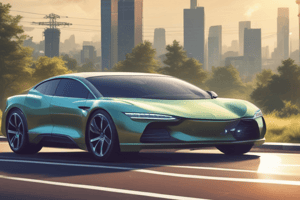Podcast
Questions and Answers
What is driving the demand for renewable energy according to the text?
What is driving the demand for renewable energy according to the text?
- RE100 coalition (correct)
- Major oil companies
- Renewable Energy Buyers Alliance
- Technologies like heat pumps
Which technology helps balance electricity demand and supply?
Which technology helps balance electricity demand and supply?
- Solar panels
- Virtual reality
- Heat pumps (correct)
- Graphene batteries
What is a concern related to electric vehicle charging infrastructure mentioned in the text?
What is a concern related to electric vehicle charging infrastructure mentioned in the text?
- Improvement in technology
- Federal investment in carbon capture
- Development of cheap batteries
- Security of the infrastructure from hackers (correct)
What is one opportunity mentioned in the text regarding the energy transition?
What is one opportunity mentioned in the text regarding the energy transition?
How are electric vehicles described in relation to a clean energy future in the text?
How are electric vehicles described in relation to a clean energy future in the text?
What is the main goal of the energy transition mentioned in the text?
What is the main goal of the energy transition mentioned in the text?
Why are lithium-ion batteries significant in the context of electric vehicles?
Why are lithium-ion batteries significant in the context of electric vehicles?
What is a key challenge associated with renewable energy sources like wind and solar?
What is a key challenge associated with renewable energy sources like wind and solar?
What is driving the global transition towards electric vehicles according to the text?
What is driving the global transition towards electric vehicles according to the text?
Which nations are mentioned as leading the way in promoting renewable energy and electrification?
Which nations are mentioned as leading the way in promoting renewable energy and electrification?
Flashcards are hidden until you start studying
Study Notes
Electric Vehicles and the Energy Transition
The global push towards electric vehicles (EVs) and a decarbonized energy landscape is a significant part of the energy transition, which aims to move away from fossil fuel-based systems to more sustainable options. Electric vehicles have the potential to play a pivotal role in reducing greenhouse gas emissions and improving air quality.
The Future of Electric Transportation
The average cost of lithium-ion batteries has decreased, leading to an increased demand for electrification in the transportation sector. The global EV adoption rate is projected to reach 10%-12.5% by 2025. Manufacturing economies of scale and corporate and consumer interest in electrification have driven this transition.
Renewable Energy and Energy Storage
Renewable energy sources, such as wind and solar, are becoming increasingly cost-effective and competitive with traditional energy sources. However, their intermittency presents a challenge. Energy storage technologies, like batteries, are being developed to address this issue, enabling the decarbonization of energy systems.
Regulatory Landscape and International Commitment
The energy transition's regulatory landscape is uneven across the globe. Some nations, like the EU and China, are leading the way in promoting renewable energy and electrification. The U.S. is also seeing increased political momentum around lower greenhouse gas-emitting power generation and a clean energy economy.
The Role of Corporations
Corporate renewable energy purchases are driving the demand for renewable energy, with initiatives such as the RE100 coalition and the Renewable Energy Buyers Alliance playing a significant role. Companies, including major oil companies, are diversifying into renewable and low-carbon energy in response to the energy transition.
Renewable Energy and Efficiency
Increasing energy efficiency is another critical aspect of the energy transition. Technologies like heat pumps and virtual power plants help balance electricity demand and supply, enabling more efficient energy usage.
Challenges and Opportunities
The energy transition brings both challenges and opportunities. For instance, the security of electric vehicle charging infrastructure is a concern, with hackers already infiltrating chargers and potentially exploiting them to disrupt the power grid. On the other hand, opportunities abound, such as federal investment in carbon capture and the development of cheap batteries that can store a lot of energy.
Conclusion
The energy transition is a complex and multifaceted process with significant implications for global societies. Electric vehicles and renewable energy storage are just two critical aspects of this transformation, which seeks to reduce greenhouse gas emissions, improve air quality, and create more sustainable energy systems. As the cost of renewable energy and energy storage continues to fall, and technology improves, electric vehicles are poised to play an increasingly important role in a clean energy future.
Studying That Suits You
Use AI to generate personalized quizzes and flashcards to suit your learning preferences.




